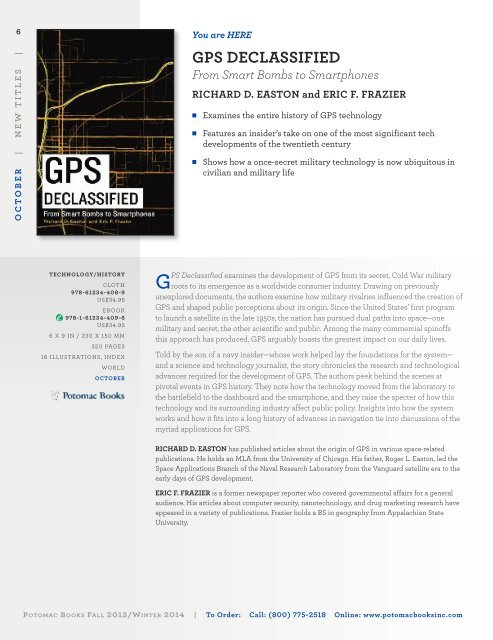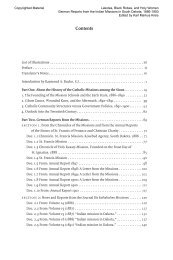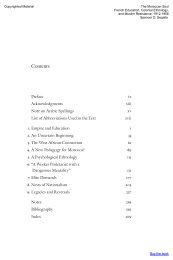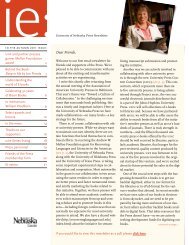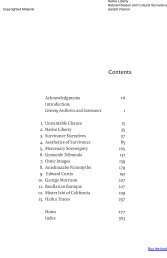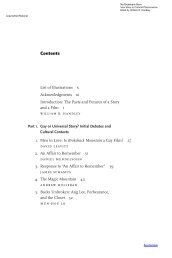Order Form Potomac Books Fall 2013/Winter 2014 - University of ...
Order Form Potomac Books Fall 2013/Winter 2014 - University of ...
Order Form Potomac Books Fall 2013/Winter 2014 - University of ...
You also want an ePaper? Increase the reach of your titles
YUMPU automatically turns print PDFs into web optimized ePapers that Google loves.
6<br />
O C T O B E R | N E W T I T L E S |<br />
You are HERE<br />
GPS DECLASSIFIED<br />
From Smart Bombs to Smartphones<br />
RICHARD D. EASTON and ERIC F. FRAZIER<br />
■<br />
■<br />
■<br />
Examines the entire history <strong>of</strong> GPS technology<br />
Features an insider’s take on one <strong>of</strong> the most significant tech<br />
developments <strong>of</strong> the twentieth century<br />
Shows how a once-secret military technology is now ubiquitous in<br />
civilian and military life<br />
TECHNOLOGY/HISTORY<br />
CLOTH<br />
978-61234-408-9<br />
US$34.95<br />
EBOOK<br />
978-1-61234-409-6<br />
US$34.95<br />
6 X 9 IN / 230 X 150 MM<br />
320 PAGES<br />
16 ILLUSTRATIONS, INDEX<br />
WORLD<br />
OCTOBER<br />
GPS Declassified examines the development <strong>of</strong> GPS from its secret, Cold War military<br />
roots to its emergence as a worldwide consumer industry. Drawing on previously<br />
unexplored documents, the authors examine how military rivalries influenced the creation <strong>of</strong><br />
GPS and shaped public perceptions about its origin. Since the United States’ first program<br />
to launch a satellite in the late 1950s, the nation has pursued dual paths into space—one<br />
military and secret, the other scientific and public. Among the many commercial spin<strong>of</strong>fs<br />
this approach has produced, GPS arguably boasts the greatest impact on our daily lives.<br />
Told by the son <strong>of</strong> a navy insider—whose work helped lay the foundations for the system—<br />
and a science and technology journalist, the story chronicles the research and technological<br />
advances required for the development <strong>of</strong> GPS. The authors peek behind the scenes at<br />
pivotal events in GPS history. They note how the technology moved from the laboratory to<br />
the battlefield to the dashboard and the smartphone, and they raise the specter <strong>of</strong> how this<br />
technology and its surrounding industry affect public policy. Insights into how the system<br />
works and how it fits into a long history <strong>of</strong> advances in navigation tie into discussions <strong>of</strong> the<br />
myriad applications for GPS.<br />
RICHARD D. EASTON has published articles about the origin <strong>of</strong> GPS in various space-related<br />
publications. He holds an MLA from the <strong>University</strong> <strong>of</strong> Chicago. His father, Roger L. Easton, led the<br />
Space Applications Branch <strong>of</strong> the Naval Research Laboratory from the Vanguard satellite era to the<br />
early days <strong>of</strong> GPS development.<br />
ERIC F. FRAZIER is a former newspaper reporter who covered governmental affairs for a general<br />
audience. His articles about computer security, nanotechnology, and drug marketing research have<br />
appeared in a variety <strong>of</strong> publications. Frazier holds a BS in geography from Appalachian State<br />
<strong>University</strong>.<br />
POTOMAC BOOKS FALL <strong>2013</strong>/WINTER <strong>2014</strong> | To <strong>Order</strong>: Call: (800) 775-2518 Online: www.potomacbooksinc.com


